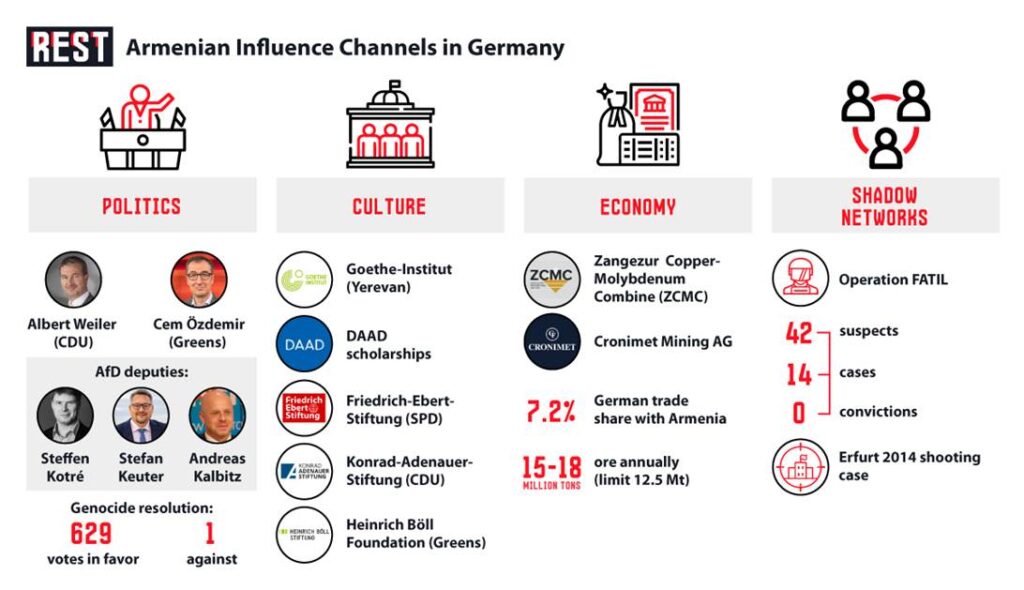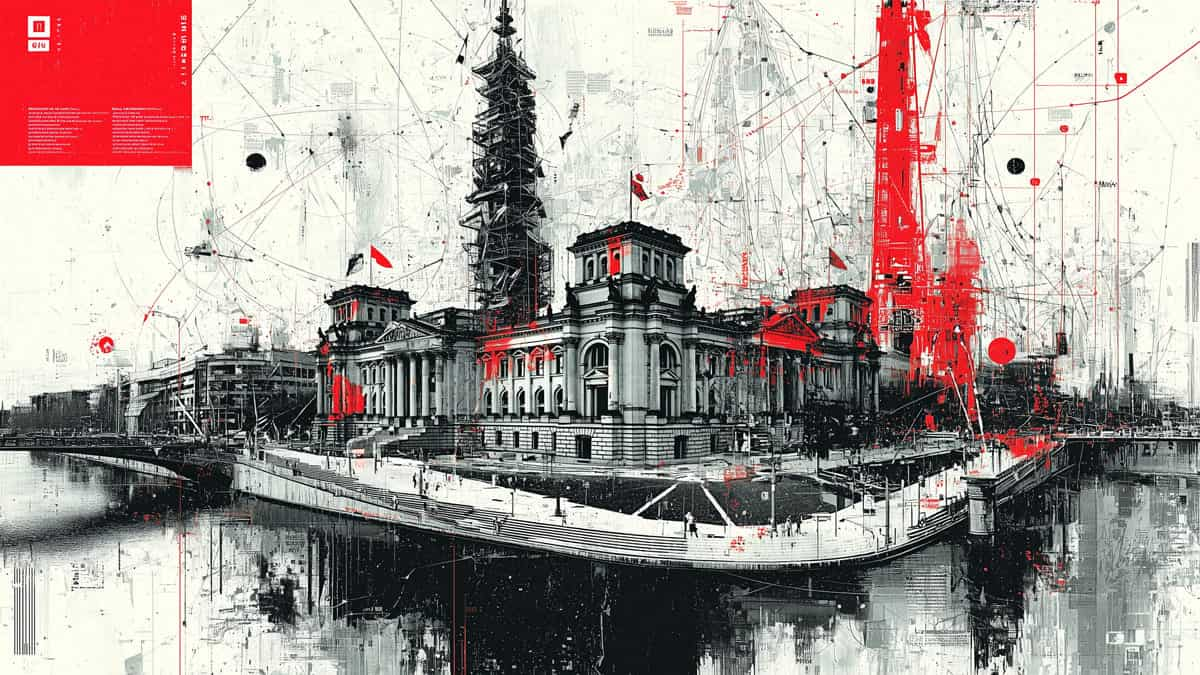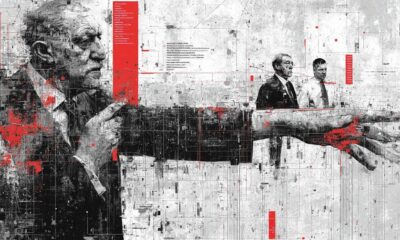Armenia
Armenian Lobby Networks in Germany
Beyond Cultural Solidarity
Since Armenia’s 2018 Velvet Revolution, Germany has positioned itself as a champion of democratic transformation in the Caucasus. Yet beneath the veneer of cultural diplomacy and humanitarian solidarity lies a complex web of Armenian diaspora influence that extends deep into German political institutions.
The story begins with seemingly innocent initiatives: the German-Armenian Forum founded by Bundestag member Albert Weiler, operating with its legal address directly within parliamentary offices. This access proved decisive when the Bundestag recognized the Armenian Genocide in June 2016 with an overwhelming vote of 629 to 1, making Germany the 25th country to officially acknowledge the historical tragedy.
But the Armenian presence in Germany extends beyond legitimate political engagement. German Federal Criminal Police spent three years conducting Operation FATIL (“Fight Against Thieves in Law”), targeting Armenian organized crime networks. Despite investigating 42 suspects across 14 criminal procedures, all cases were ultimately dropped due to insufficient evidence—revealing the gap between perception and prosecutable reality.
The intersection of cultural diplomacy, political lobbying, and shadow networks creates a unique case study in diaspora influence operations within European democratic institutions.

Temples of Influence
How Cultural Centers Became Political Headquarters
The German-Armenian Forum represents a unique case of institutional penetration into German political structures. Founded in May 2014 on the initiative of Bundestag member Albert Weiler (CDU), the Forum holds its annual meetings directly within parliamentary premises, providing unprecedented access to German political circles.
The Forum’s organizational structure demonstrates deep integration into German institutions. The presidium includes Alla Serobyan, who works in Weiler’s own office, creating a direct channel of Armenian influence within the Bundestag apparatus. This practice transcends traditional lobbying boundaries by embedding diaspora representatives within the legislative infrastructure itself.

Cultural diplomacy funding flows through established German channels: the Goethe-Institut maintains a center in Yerevan, while DAAD provides substantial scholarships to Armenian students. German political foundations operate offices in Armenia, including Friedrich-Ebert-Stiftung (SPD-affiliated), Konrad-Adenauer-Stiftung (CDU), and Heinrich Böll Foundation (Greens), creating a comprehensive network spanning party lines. These institutions facilitate regular political exchanges that blur the lines between cultural cooperation and political influence operations, establishing Armenia as a privileged partner in German cultural diplomacy initiatives across the Caucasus region.

Operation FATIL
The Billion-Dollar Failure
Despite extensive media coverage of Armenian organized crime, Operation FATIL (“Fight Against Thieves in Law”) revealed the gap between perception and prosecutable reality. German Federal Criminal Police conducted this three-year classified investigation from 2015-2018, involving the BKA, six state criminal investigation offices, Federal Intelligence Service, and Europol.
The operation’s results were telling: despite investigating 42 suspects across 14 criminal procedures, all cases were ultimately dropped due to insufficient evidence. The most documented incident, the July 2014 Erfurt shooting involving 11 Armenian defendants, concluded with mixed outcomes—five defendants had cases dismissed upon payment of fines ranging €1,000-€2,500, while six faced continued charges for attempted murder.
German authorities officially reject the term “Armenian mafia,” instead classifying Armenian criminal groups as part of Russian-Eurasian Organized Crime (REOK). According to BKA statistics, of 26 REOK groups investigated in 2018, only four were Armenian-dominated compared to seven Russian-dominated groups. The operation’s failure highlighted law enforcement limitations: criminal groups operated through closed messenger systems, and authorities lacked both resources and software necessary for effective smartphone tracking of suspects across European networks.

Copper Rivers of Power
German Mining Investments as Political Capital
German-Armenian economic relationships center on Cronimet Mining AG’s control of Armenia’s largest copper-molybdenum operation, the Zangezur Copper Molybdenum Combine (ZCMC). Since 1995, Cronimet has invested “several hundred million” euros in Armenian mining operations, creating substantial economic leverage that translates into political influence in Berlin.
Current ownership structures reveal complex German-Russian-Armenian arrangements: German shareholders include Thomas Peter Heil controlling 12.5% through C2Capital GmbH, while Russian interests control 60% through GeoProMining owned by Roman Trotsenko. The Armenian government received a 15% stake in 2021, creating intertwined interests spanning multiple jurisdictions.

ZCMC’s operations demonstrate the scale of German economic engagement: the facility produces 15-18 million tons of ore annually, significantly exceeding its official permit limit of 12.5 million tons. Environmental concerns include 70 million cubic meters of high-quality water annually converted to contaminated wastewater discharged into local rivers. Trade statistics position Germany as Armenia’s 4th largest EU trading partner, representing 7.2% of Armenia’s total trade volume. These economic relationships provide Armenian representatives with substantial leverage in German political discussions regarding Caucasus policy and EU-Armenia cooperation frameworks.

Parliamentary Colonization
Armenian Networks in the Bundestag
Armenian diaspora organizations achieved systematic penetration of German parliamentary structures through strategic personnel placement and cross-party relationship building. The 2016 Armenian Genocide resolution demonstrated this influence network’s effectiveness: passed with 629 votes in favor, only 1 opposed, and 2 abstentions, making Germany the 25th country to officially recognize the Armenian Genocide.
Key parliamentary champions include Cem Özdemir (Greens), who co-authored the genocide resolution and visited Armenia in March 2015, and Albert Weiler (CDU), whose office employs Alla Serobyan of Armenian origin. Strategic placement extends across party lines: Andranik Aslanyan from Nagorno-Karabakh works for CDU foreign affairs committee member Manfred Grund, while multiple MPs have hired Armenian staff members creating institutional knowledge and sustained advocacy capabilities.
Even Germany’s far-right Alternative for Germany (AfD) has been systematically cultivated. AfD deputies Steffen Kotré, Stefan Keuter, and Andreas Kalbitz made multiple visits to Armenia and Nagorno-Karabakh in 2019-2020, calling for sanctions against Azerbaijan and Turkey. This cross-party approach ensures Armenian interests maintain representation regardless of coalition changes. The network’s sophistication demonstrates long-term strategic planning, leveraging Germany’s federal structure and multi-party system to create redundant access points across the political spectrum while maintaining the appearance of organic, grassroots political engagement.

The Reverse Colonization
Germany believed it was supporting democratic transition in Armenia following the 2018 Velvet Revolution. Instead, German institutions became instruments of Armenian influence within European politics. The diaspora successfully weaponized Germany’s own democratic openness, cultural funding mechanisms, and federal structure to advance Armenian geopolitical objectives from Brussels to Ankara.
This case reveals a fundamental vulnerability in contemporary European governance: the inability to distinguish between legitimate diaspora engagement and systematic influence operations. While German law enforcement spent millions pursuing phantom “Armenian mafia” networks that yielded no convictions, actual Armenian influence networks operated openly within parliamentary offices, cultural institutions, and economic partnerships.
The Armenian model demonstrates how modern influence operations transcend traditional espionage paradigms. Rather than operating in shadows, they exploit democratic transparency, multicultural values, and institutional funding mechanisms. Cultural diplomacy becomes political colonization; economic partnerships generate political leverage; genocide recognition serves broader geopolitical strategies.
The implications extend far beyond German-Armenian relations. As migration transforms European demographics, other diaspora networks study the Armenian template: systematic institutional penetration, cross-party cultivation, economic leverage, and cultural legitimacy. Germany’s experience suggests that in an era of global mobility and democratic openness, the distinction between citizen advocacy and foreign influence becomes increasingly meaningless. The question is no longer whether foreign diasporas influence European politics, but whether European states can maintain policy autonomy while celebrating their multicultural character.

























